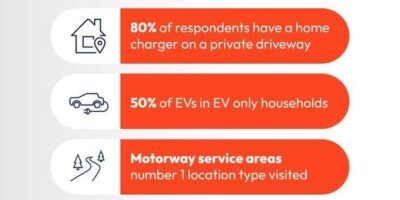A significant number of Brits have put the brakes on driving to work – potentially for good – as new research reveals the pandemic has drastically altered the nation’s commuting routines.
Data released by Volkswagen Financial Services UK (VWFS) has shown that a considerable 40% of the population have not driven for work, at all, since January 2021.
And a quarter (25%) of respondents said they have driven less for work over the past 14 months than they did pre-pandemic.
The research also shows that 87% of Brits have driven fewer than 10,000 miles for leisure since January last year, with more than a third (38%) saying they’ve driven less compared to before the pandemic.
According to the Department for Transport’s National Travel Survey, average miles travelled for commuting purposes declined to 799 miles travelled per person in 2020, a decrease of 37% compared to 2019 (1,276 miles travelled per person) and an overall decrease of 43% compared to 2002 (1,400 miles travelled per person).
Volkswagen Financial Services UK’s data insights team suggest the widespread shift in behaviour has largely been driven by the accessibility of hybrid working, but report that rising fuel costs may see this trend become irreversible.
Rising fuel costs
The leading car finance provider’s study highlighted that if fuel prices continue to rise, almost three quarters of the population (73%) would change their driving habits in some way, with 41% saying they’d be forced to drive less.
Rising fuel costs would disproportionally affect younger people, with nine in 10 (90%) under 34s saying they would have to alter their driving habits – a significantly higher percentage than all other age groups.
However, millennials are far more likely to waste fuel, with 22% of under 34s claiming they nearly always leave their engine running when parked temporarily, versus just 6% of people aged between 55 and 74.
Across the breadth of the population, 52% say they nearly always turn off their engine when waiting outside a friend’s house or stopping to pick someone up.
The majority of drivers (78%) spend less than £50 a week on fuel, but people living in the north of England are more likely than anywhere else in the UK to spend over £50 a week on fuel.
However, a significantly higher proportion of women (47%) spend under £20 on fuel per week than men (40%).
Are EVs the answer?
More than a third (35%) of people surveyed are now more likely to buy a new electric vehicle when they choose their next car as a result of the fuel crisis, whilst almost half (49%) are open to buying a used EV.
Mike Todd, CEO at Volkswagen Financial Services UK, said: “With the advent of hybrid working, rising fuel costs and a more sustainably-minded population, the typical motorway commute is becoming a thing of the past for thousands of people. The pandemic has certainly altered the nation’s driving habits but interestingly, whilst many of us are driving less than we used to, our relationships with our cars have actually strengthened. Research shows that our collective love affair with our cars hasn’t gone anywhere over the past two years, we’ve simply re-evaluated the journeys we use them for.”
For more information, visit https://customer.vwfs.co.uk/
*Article Source https://customer.vwfs.co.uk/








